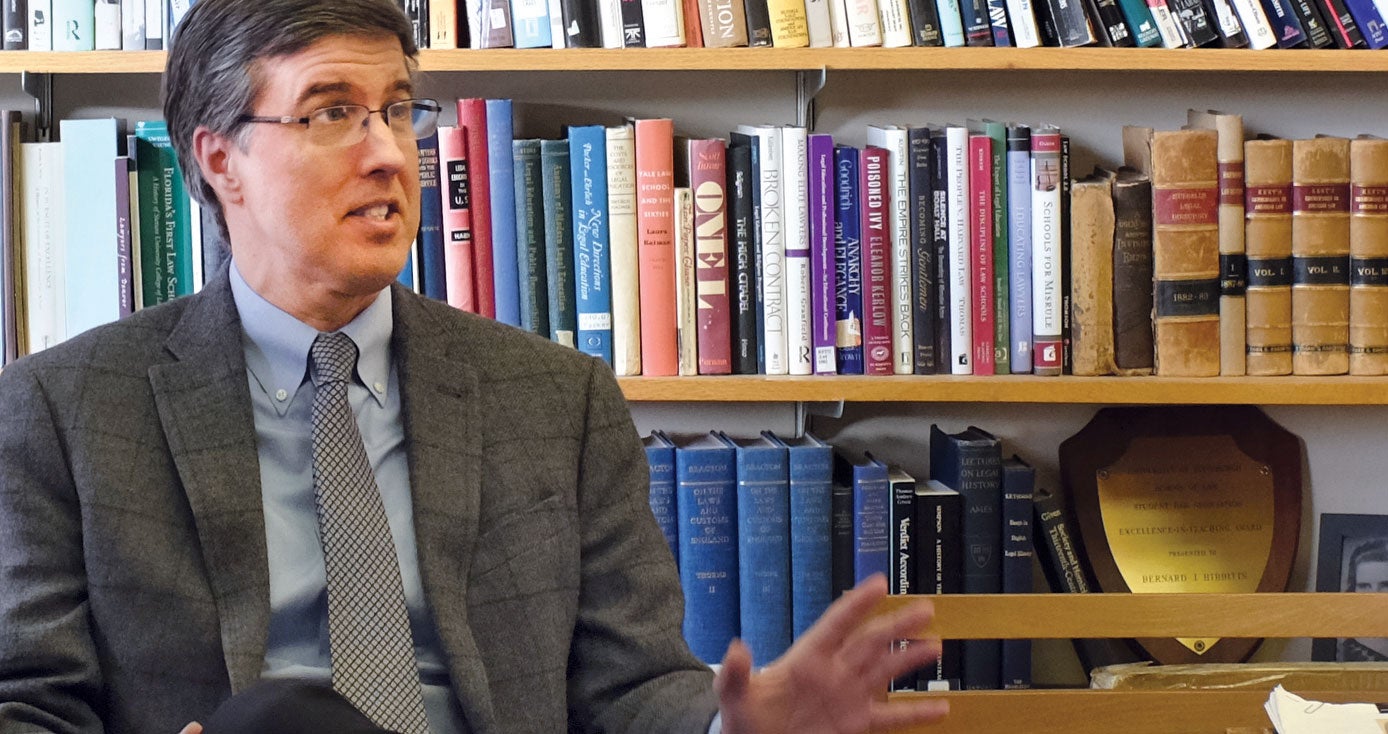
Subscribe to Pittwire Today
Get the most interesting and important stories from the University of Pittsburgh.Legal News and Research Service Is Fast, Informed Spin on Traditional Law Journal
Take today’s news — all of it — and sift through to find the stories with real-world legal ramifications. Chances are there is much more than can be covered by any traditional media outlet in a 24-hour news cycle.
Enter JURIST, the online legal news and research service housed at the University of Pittsburgh’s School of Law. Though it has roots in academia, JURIST is a public service. While traditional law reviews or quarterlies circulate a few times a year, JURIST keeps pace with the legal issues of the day in real time, publishing new content every day of the year. And it’s staffed by a team of more than 60 law students.
The students apply for highly competitive volunteer spots as writer-reporters, editors and web developers, in addition to their already rigorous law school curriculum. Guided by Executive Director Andrew Morgan (LAW '11) and Research Director Jaclyn Belczyk (LAW '08), the students work around the clock in two-hour shifts, using primary source reporting to trim the fat on breaking news stories that have a legal bent.
"I can say confidently, as far as I'm aware, we're still the only ones doing what we do," Morgan said. "There are other things, like law reviews or quarterlies or the like, but not the day-to-day news grind that we subject ourselves to."
JURIST has been cited by top scholarly publications including the American Journal of International Law, the Harvard and Columbia Law reviews, the Stanford Technology Law Review and the Yale Law and Policy Review, among others. It has been referenced by the New York Times and other major media outlets. Other accolades include a Webby Award.
In real time, JURIST’s news arm, Paper Chase, distills breaking news into short articles of just the facts, heavy on links providing context and references.
“We try to take the legalese out of it and say, ‘This is what actually happened today,’” said Morgan. “It’s a skills-building exercise for people intending to be lawyers,” he added.
JURIST alumni have gone on to successful careers in litigation; legal journalism, including at such outlets as Bloomberg and Law360; and nonprofit organizations, to name a few.
In addition to current events analysis, the site features curated academic and professional legal commentary on the day’s biggest issues. Experts and analysts from all over the world offer submissions and contribute as guest columnists. The commentary section receives submissions from such organizations as the Human Rights Watch and Amnesty International. Readers from Turkey to Toronto visit the site. JURIST's own website describes the publication as "an online fusion of PBS and C-SPAN for legal news. In international terms, JURIST's objective news philosophy and its global agenda are modeled on the BBC World Service."
Also on JURIST
If you’ve ever appreciated the authority of a good legal expert in your podcast queue; needed a refresher on famous trials; mused over the 2000 presidential election hanging chad debacle; had a question about the rules that shape any federal agency; wondered what happened this day at law in history or found yourself curious to poke through a legal news archive dating back to January 2003, JURIST has you covered.
“I’m constantly shocked” at the reach it gets, Morgan said with a laugh, considering the lean operation and its modest headquarters — two adjoining offices in the stacks of the Barco Law Library.
Though regularly delighted at the wide audience JURIST draws, publisher and editor-in-chief Bernard Hibbitts isn’t surprised. “Law is involved in every part of human life,” he said.
“We’re using the latest technology to talk to citizens about law and legal developments, helping them understand what is happening. I think law schools have a role in doing that.”
The early days
One day in 1996, a young Pitt law professor named Bernard Hibbitts sat down to teach himself HTML, the coding language used as a basis for web pages.
“I decided it would help me communicate with people on the outside,” he said.
It took Hibbitts a morning’s work to create JURIST, then called Law Professors on the Web. It was one of just 100,000 existing sites during the internet’s early days, compared to the over 1 billion sites today. Google wouldn’t emerge for another two years’ time. The same year he started JURIST, Hibbitts also published what he believes to be the first full-length scholarly legal article made specifically for the web, putting it online before submitting it to any traditional law journal.
Very quickly, what started as a way to connect with far-afield colleagues began to grow. Blogging technology created a space for other people to jump on board, and a group of legal scholars sharing their expertise beyond the walls of universities and law reviews had far-reaching appeal. Hibbitts took on a student volunteer to help manage the workload, then a few more.
“People were interested in things that we were thinking and doing, especially on matters of current interest,” Hibbitts said. The server crashed once from so many hits during President Bill Clinton's impeachment trial and the same happened after Iraqi President Saddam Hussein was executed in 2006, he said.
There aren’t many 20-year-old websites that still operate today, Morgan pointed out. Under Hibbitts’ direction and a few website upgrades, JURIST has not only survived, but thrived through a shifting media climate.
For the students who power it, Hibbitts said, it encourages them to think about their position in the world, and about educating other people while they’re being educated here at Pitt.
Ingrid Burke (LAW '11) has lived out a natural extension of her work as JURIST’s commentary staff senior editor and, later, managing editor in her career as a professional journalist. The people at RIA Novosti, a major Russian news agency, overlooked her lack of traditional journalism experience when they hired her as a reporter straight out of law school — she said, due in large part to her leadership roles at JURIST.
A few years later, she moved on to become deputy head of the news desk at The Moscow Times.
As a legal historian, Hibbitts acknowledges that JURIST is an unusual enterprise in a profession steeped in tradition — but he has always favored innovation and creativity over convention.
“Law reviews are legal research and writing for the 19th century because they were created at Harvard in the late 1880s,” he said. “We’re training students to go out and be writers and researchers and explainers, now. They have to write concisely, they have to be quick, they have to research correctly, they have to be able to keep up with the busy world. … They’re learning how to deal with law and language in real time, and that’s the greatest gift we can give them.”




